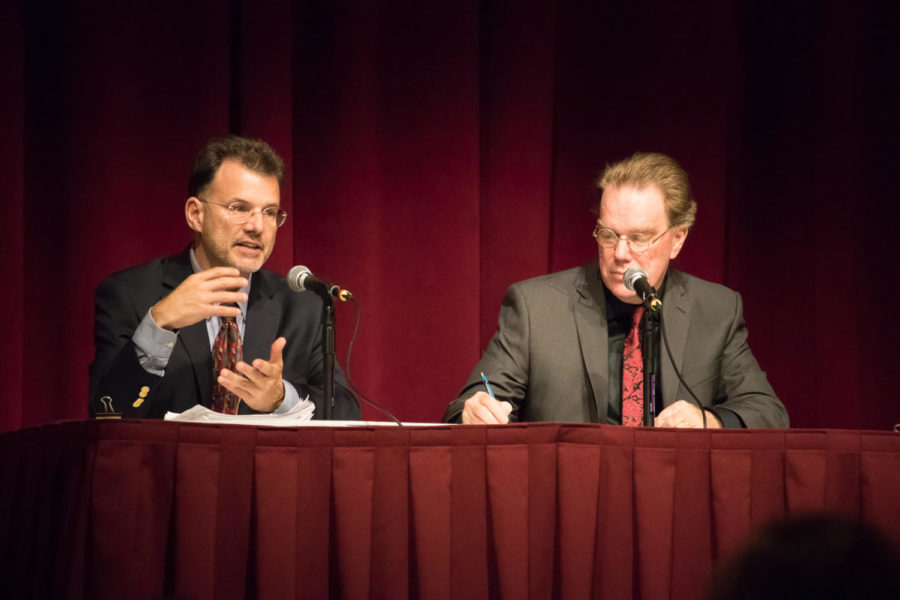Iowa State holds panel on state of Supreme Court and recent decisions
Megan Mojeiko/Iowa State Daily
Clark Wolf, director of bioethics and professor of philosophy at Iowa State University, discusses the ethics of supreme court rulings that are influencing the upcoming election. He is also joined by his colleague, Dirk Deam, professor of political science, on September 26, 2016.
October 3, 2018
The state of the Supreme Court has been a recent topic of discussion and the main point of a panel held in the Memorial Union as the prospect of another conservative justice could set its makeup for years to come.
The panel was held 7 p.m. Wednesday in the Sun Room of the Memorial Union.
The panel featured Dirk Deam, a senior lecturer in the political science department; Clark Wolf, the director of Iowa State’s bioethics program; and Mark Kende, the James Madison chair on Constitutional Law at Drake University. The panel focused on recent Supreme Court rulings regarding gerrymandering, immigration, worker rights and businesses’ right to refuse service on the basis of religious beliefs.
The panel also discussed important cases recently decided by the Supreme Court and the implications of those decisions.
The panel was faced with a question regarding Kavanaugh’s treatment during the recent Senate Judiciary Committee hearings.
“I am not convinced that he was treated unfairly,” Kende said. “Although, I do understand that he feels like he was because he denies the accusations.”
Deam said constitutional law depends on the people’s belief in the integrity of the courts, and without this belief, the law begins to fall apart.
Deam continued by saying judicial nominees must avoid even the appearance of impropriety, so the integrity of the institution can be maintained. Deam said one must take these considerations into account when evaluating the fairness of the hearing.
The panel also discussed worker’s rights. In particular they focused on two cases. First, they discussed the recent ruling in the Janus v. AFSCME. This case ruled it was a violation of non-union members’ First Amendment rights for a union to collect dues from them.
“For the last 41 years it has been considered permissible for unions to collect dues from non-union members,” Wolf said. “The way this came down was that unions are held responsible to represent equally union and non-union members.”
Wolf said he was concerned this case would weaken unions and their ability to represent workers. He also noted that case overturned a 41-year precedent, as well as the laws in 22 states. He said this was odd for John Robert’s court because to this point it had made changes on a smaller scale.
The panel talked about the Masterpiece Cakeshop case. The Supreme Court decided since the Colorado Civil Rights Commission did not act in a neutral manner toward religion, they violated the rights of the plaintiff.
The Supreme Court’s ruling on Trump v. Hawaii was also a topic of discussion for the panel. In this case, the Supreme Court ruled that Presidential Proclamation 9645, the so-called ‘Muslim ban,’ did not violate the establishment clause of the First Amendment nor the Immigration and Nationality Act.
Kende said it was interesting how the Supreme Court ruled against government animosity toward religion in the Masterpiece Cakeshop case, but did not take into account the president’s comments toward Islam when deciding Trump v. Hawaii.
“In both cases animosity by the government is present arguably,” Kende said. “And yet the cases in both situations come out in favor of the administration’s position.”







